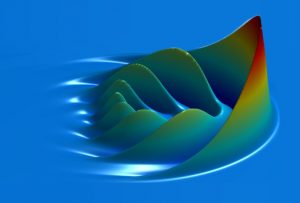 The quest to devise a non-commutative counterpart of the Monge-Kantorovich optimal transport theory began about thirty years ago with early proposals by Connes and Voiculescu. These early attempts focused mostly on the static Monge and Kantorovich formulations using duality theory. At about the same time, a dynamical reformulation of optimal transport was taking place in the works of Benamou and Brenier, McCann, and Otto. The ensued recasting of the Fokker-Planck equation as the gradient flow of the free energy in the Wasserstein metric by Jordan, Kinderlehrer and Otto proved pivotal, with applications from geometry to fluid mechanics and thermodynamics.
The quest to devise a non-commutative counterpart of the Monge-Kantorovich optimal transport theory began about thirty years ago with early proposals by Connes and Voiculescu. These early attempts focused mostly on the static Monge and Kantorovich formulations using duality theory. At about the same time, a dynamical reformulation of optimal transport was taking place in the works of Benamou and Brenier, McCann, and Otto. The ensued recasting of the Fokker-Planck equation as the gradient flow of the free energy in the Wasserstein metric by Jordan, Kinderlehrer and Otto proved pivotal, with applications from geometry to fluid mechanics and thermodynamics.
As a result of these developments, a new angle for casting dynamics in a non-commutative environment emerged. The first proposal was put forth by Carlen and Maas to devise a gradient flow theory in the quantum setting. In parallel to this entropy-centric dynamical template, a rich mosaic of alternatives drew upon the early Connes’ proposal and on the Riemannian structure of statistical manifolds, to devise natural metrics and geodesic flows in the space of positive Hermitian and density operators.
This developing landscape has left us with several natural questions. What are underlying unifying principles? Which of these structures provide implications in quantum physics? Can these structures predict new physical properties, such as natural time constants of quantum processes? Can functional inequalities and rates provide answers to these questions? Is there a natural notion of curvature that dictates non-commutative flows and brings further insights into quantum evolutions? Is there a stochastic model for non-commutative transport?
With many questions and few answers, it is our hope and expectation that the workshop will provide creative feedback and help spur further progress on this fast-developing subject. Complementing views will help focus, specifically, on problems of potentially great physical significance.
Tryphon Georgiou
(University of California, Irvine (UCI))
Leonard Monsaingeon
(Group of Mathematical Physics of the University of Lisbon (GFMUL))
Oliver Tse
(Eindhoven University of Technology)